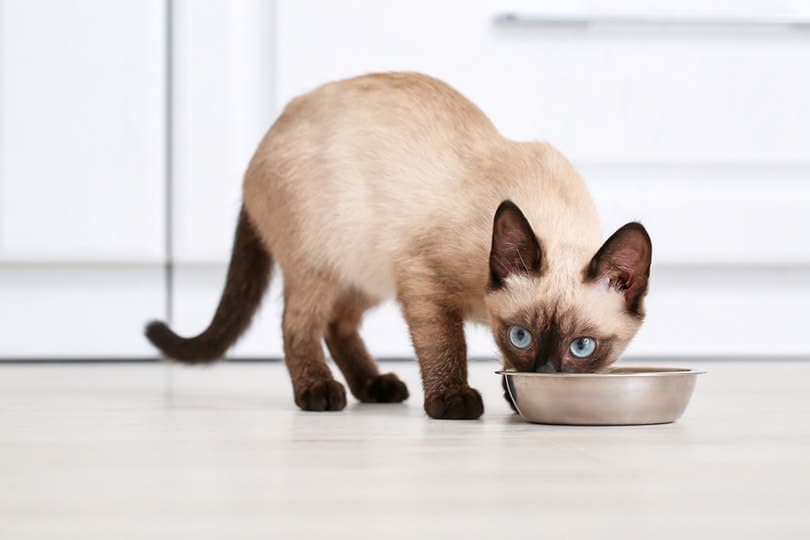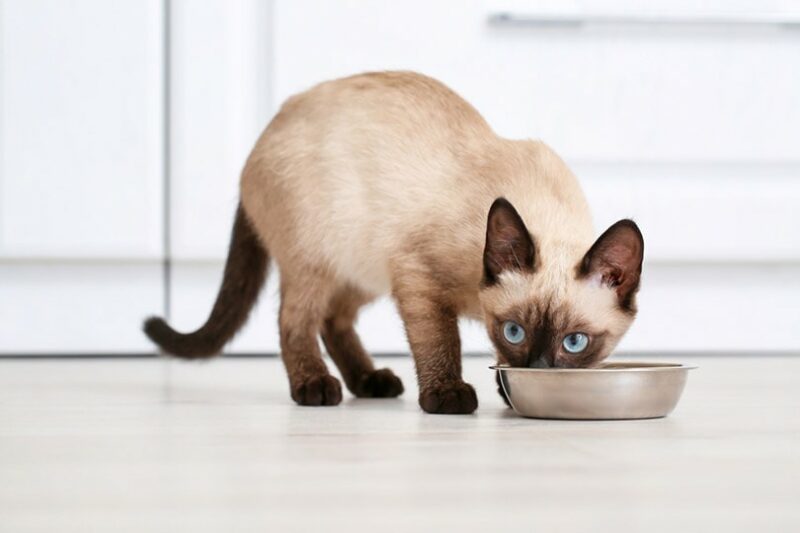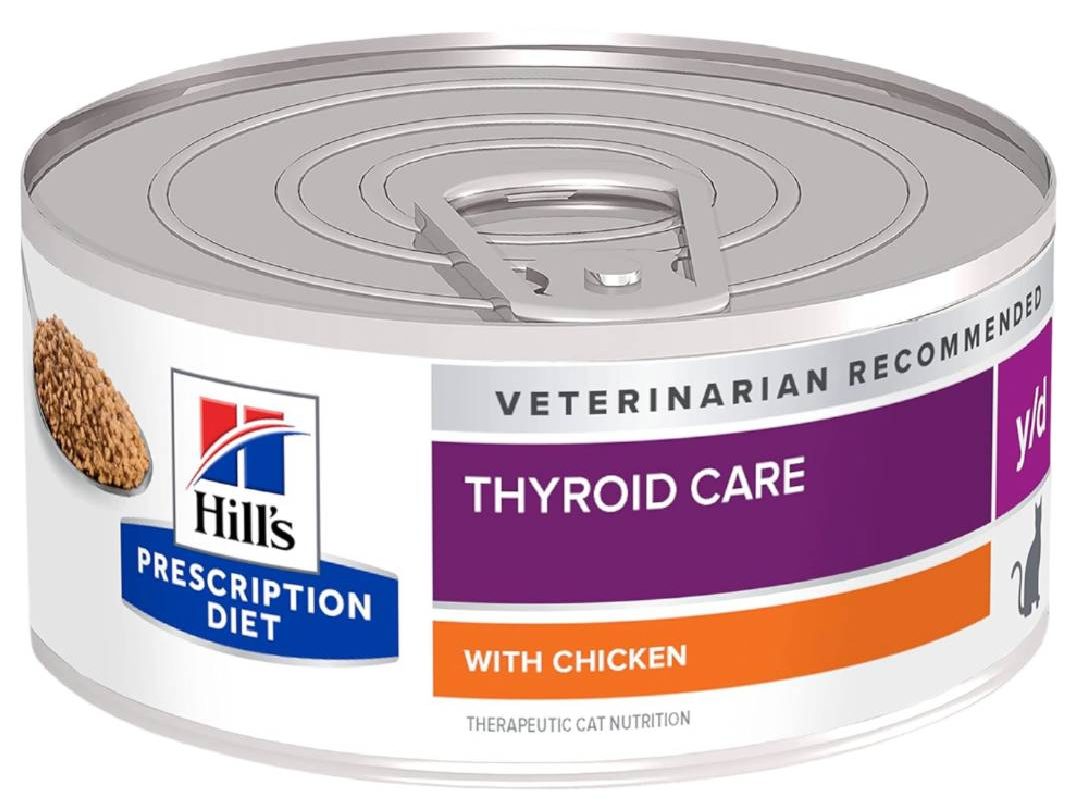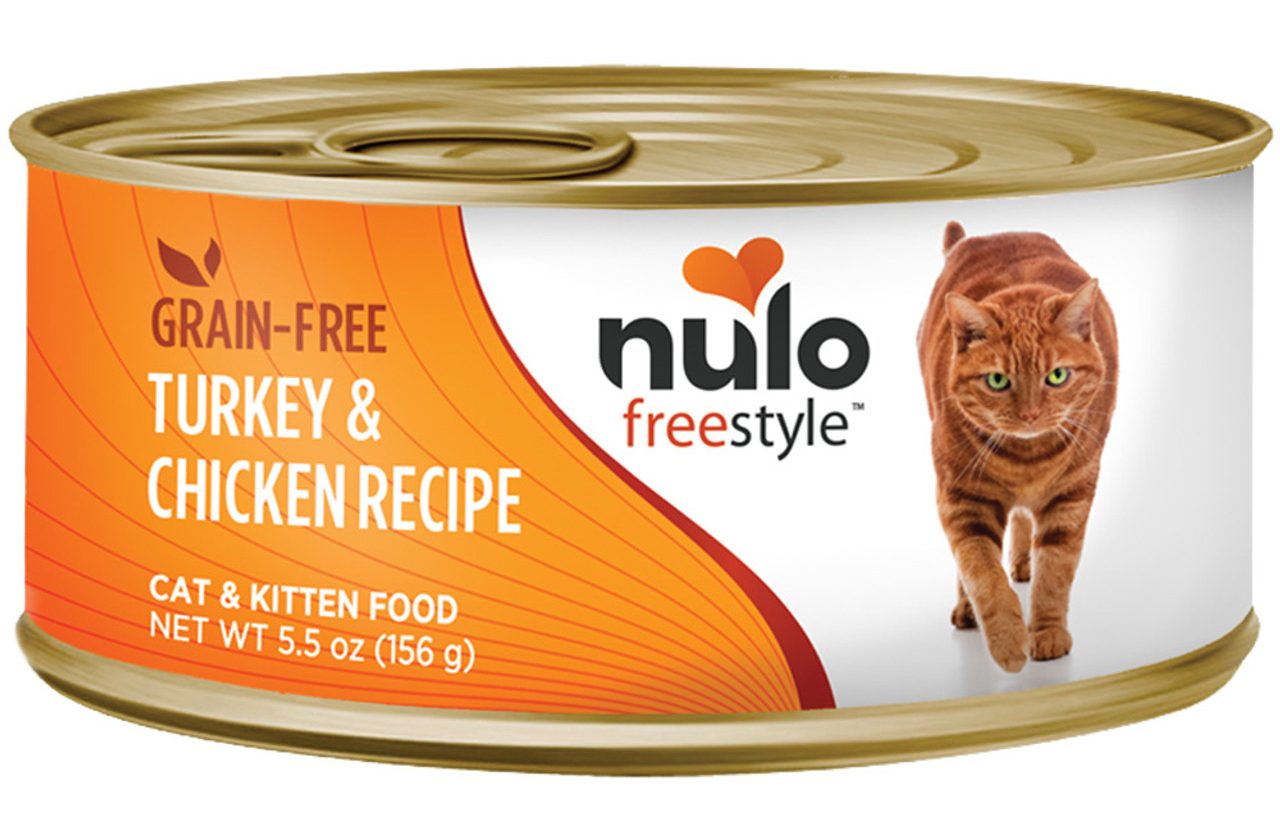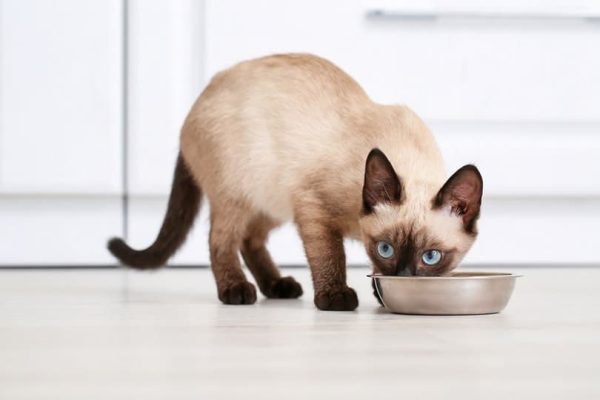
The primary cause of hyperthyroidism in cats, or thyrotoxicosis, is an increase in the T3 and T4 hormones produced and released from the thyroid glands. Once your cat is diagnosed with hyperthyroidism, you must manage their lifestyle, from their medication to their hyperthyroidism diet.
In recent years, studies have shown that a cat’s diet can either help manage hyperthyroidism or make it worse. You want to feed your cat a diet with severely restricted iodine levels. This helps normalize the levels of T4 produced by the thyroid. It isn’t the only thing that you can do, but it is another option for the medical management of the disease.
If your cat has been diagnosed with hyperthyroidism, it is best to switch them to cat food for hyperthyroidism right away. To help you make the change smoothly, we have reviews for the top six best cat foods for hyperthyroidism, so you can make an efficient and well-informed decision.
Disclaimer: The foods reviewed here were chosen because they have certain characteristics that might help with some of the causes or consequences of this medical condition. However, they are not a medical treatment or a substitute for medical treatment. Keep in mind that each medical case is different and what works for some pets may not work for others. Your veterinarian is the right person to advise you on the best diet for your pet’s individual case.
A Quick Comparison of Our Favorites in 2024
| Image | Product | Details | ||
|---|---|---|---|---|
| Best Overall |

|
Wellness Complete Health Canned Cat Food |
|
CHECK PRICE |
| Best Value |

|
Solid Gold Indigo Moon Dry Cat Food |
|
CHECK PRICE |
| Premium Choice |
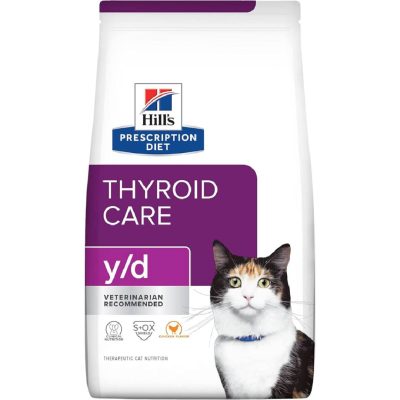
|
Hill's Prescription Diet Thyroid Care |
|
CHECK PRICE |

|
Hill's Prescription Diet Thyroid Care Canned Cat Food |
|
CHECK PRICE | |

|
Nulo Freestyle Grain-Free |
|
CHECK PRICE |
The 6 Best Cat Foods for Hyperthyroidism
1. Wellness Complete Health Grain-Free Canned Cat Food – Best Overall

This food is a wet canned food in the form of pâté is meant to be a healthy, grain-free option for your furry feline. It is filled with high-quality protein that comes from chicken. It also has ingredients like carrots, flaxseed, and cranberries. These ingredients help support your cat’s immunity via antioxidants and urinary health and help them grow a healthy coat and maintain healthy skin through omega fatty acids.
Although this food was ultimately crafted for whole-body health, it functions as a positive balancing agent for cats with hyperthyroidism because it has low iodine levels. It avoids ingredients that often bring in high levels of iodine, such as eggs, dairy, and seafood.
This thyroid food is completely free from corn, wheat, soy, and any other grain. It is meant to support your cat’s urinary and digestive health, which helps mitigate some of the symptoms associated with hyperthyroidism. It is also made in the U.S.A., with internationally sourced ingredients, and it has a texture that most cats love.
All in all, we think this is the best cat food for hyperthyroidism.
- Made in the U.S.A.
- Grain-free
- Low iodine levels while high in antioxidants
- Some ingredients are sourced from outside the U.S.A.
2. Solid Gold Indigo Moon Dry Cat Food – Best Value

This food from Solid Gold comes in 3-pound, 6-pound, and 12-pound bags, making it a practical choice if you want to try it out or commit to it for longer. It is entirely grain- and gluten-free, making it healthier for the average cat and easier for a cat with hyperthyroidism to digest.
The protein level in this food is 42%, which is relatively high. This protein is suitable for a cat that needs to rebuild their muscles after or during they experience the symptoms of weight loss and loss of muscle mass that comes with an overactive thyroid. If your cat is beginning to experience kidney failure, though, this is not the best option for them.
The protein comes from chicken and eggs. Eggs contain more iodine than would be preferred, but the quantity is limited in this food. It is made specifically to encourage gut health in cats by including probiotic supplements. The inclusion of seafood and eggs makes the iodine levels slightly higher than they should be, but it is still a healthy food and the best cat food for hyperthyroidism for the money.
- Budget-friendly
- High protein for cats recovering from hyperthyroidism
- Encourages gut health with probiotics
- Includes higher iodine levels than preferred
3. Hill’s Prescription Diet Thyroid Care Dry Cat Food – Premium Choice
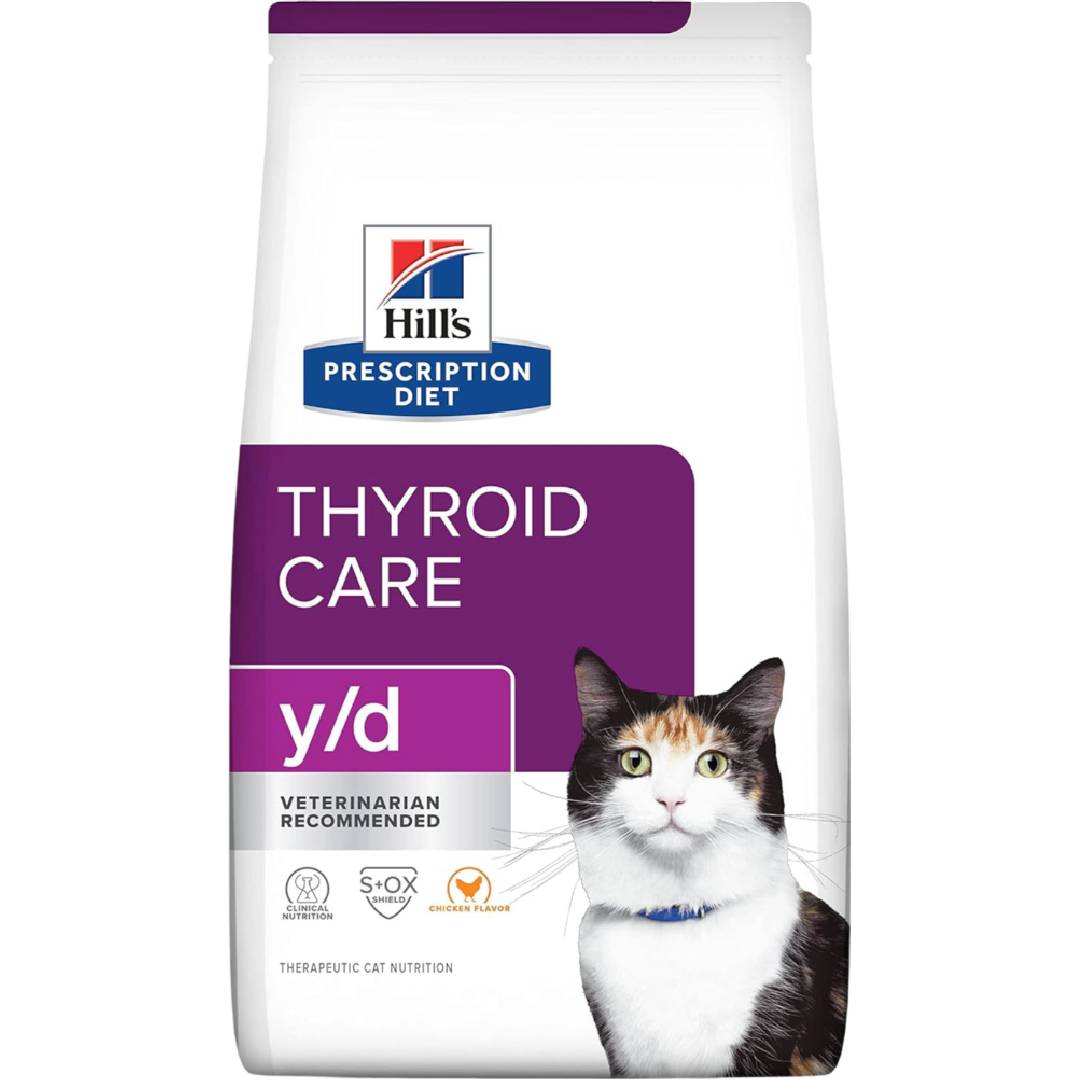
Hill’s Prescription Diet Thyroid Care Dry Cat Food is arguably one of the best choices out there when it comes to prescription food and dealing with thyroid problems. It is third on our list because it is a prescription food, which means you can only get it with permission from a veterinarian.
Also, this dry food is quite expensive per bag and should only be fed to cats with thyroid problems. It comes in 4- and 8.5-pound bags.
Due to the outstanding balance of ingredients in this food, it has been clinically proven to restore thyroid health in as little as 3 weeks. It does this by decreasing T4 hormone production while supporting the health of the kidney, urinary tract, and heart. Although the food does specifically help balance the thyroid and does it well, it contains debatable ingredients. These include things like corn gluten meal and soybean mill run.
- Clinically proven to restore thyroid health
- Encourages the health of the kidney and urinary tract
- Decreases the T4 hormone
- Expensive
- Some debatable ingredients
4. Hill’s Prescription Diet Thyroid Care Canned Cat Food
The Hill’s Prescription Diet Thyroid Care Canned Cat Food comes in a case of 24 so you will get more than enough in one order to get your cat through the worst of their thyroid problem. Each tin is 5.5 ounces, balanced for a meal to nourish your cat back to health.
This canned food’s texture is pâté, making it palatable for even the pickiest of cats. It also helps them stay hydrated even as they experience more challenging symptoms associated with hyperthyroidism. When this thyroid cat food is the sole source of nutrition, it is proven to restore thyroid health within 3 weeks.
Other than helping restore the health of your cat’s thyroid, the food also supports kidney health by keeping the phosphorus and sodium levels low. It also contains omega fatty acids. These encourage healthy skin and coat, to keep your cat looking healthy as they begin to feel better again.
- Supports overall health of the thyroid and kidney
- Includes omega fatty acids
- Promotes heart health with taurine and carnitine
- Expensive
5. Nulo Freestyle Grain-Free Canned Cat & Kitten Food
This food from Nulo in their Freestyle line helps keep your cat feeling healthy, even with a thyroid issue. It comes in cases of 24 and 12, with respective sizes of 5.5 and 12.5 ounces. It is cheaper than Hill’s Prescription Diet but isn’t as targeted to help with thyroid problems.
The Nulo Freestyle Turkey and Chicken recipe is made with real turkey as the first ingredient and then chicken and turkey liver. Unfortunately, the food does contain tuna, which increases the iodine levels slightly. However, it doesn’t have enough to make a noticeable difference for a recovering cat.
The positive aspects of this thyroid cat food are that it is entirely grain-free, it has no corn, soy, or gluten, and it is low glycemic and pea-free. Also, it is high in healthy protein. As long as your cat isn’t suffering from kidney failure, they will benefit from the protein level of at least 11% in this food. The texture and broth base is also palatable to a wide variety of cats.
- Features chicken and turkey as first ingredients
- Keeps your cat hydrated with a broth base
- High in protein
- Contains tuna
6. Feline Natural Grain-Free Canned Cat Food
Feline Natural is the most expensive food on this list, but it is because of the priority that this New Zealand-based company puts on its ingredients and recipes. This canned food is full of breed-specific ingredients. That is why it is made up of 98% fresh meat, organs, and ground bone.
The rest of the food is water for processing canned food, nutrients like taurine to promote heart health, and Vitamin D3 supplements. Although it is not usually an issue for cat food, this recipe does include New Zealand green mussel and dried kelp. While these are highly nutritious for cats, they do increase the iodine level present in the food. These ingredients collectively only make up 1% of the total recipe, though.
Every ingredient that the company includes in this grain and gluten-free high-protein diet is high-quality. The chicken and venison are only sourced from the best throughout New Zealand and are free-range and grass-fed. There are no artificial ingredients or preservatives. It is a nutritionally appropriate diet meant for all breeds.
- Highest quality ingredients are used
- Free from wheat, soy, rice, and gluten
- High levels of protein and breed-appropriate nutrients
- Expensive
- Includes mussels and kelp
Buyer’s Guide: Picking the Best Cat Food for Hyperthyroidism
Feeding a cat with hyperthyroidism can be tricky. There are different kinds of foods that they should get depending on their age, stage of the disease, and whether they are on the road to recovery. What might not be suitable for them at some points might end up being necessary at others.
It is also essential to consider the subsidiary diseases that your cat might suffer from as a result of a defunct thyroid, such as kidney failure. This brings in an entirely new gamut of dietary concerns.
If you are struggling to figure out how to feed your cat, here is a brief buyer’s guide to help point you in the right direction. With something like this life-threatening disease, though, it is always best to talk to your veterinarian.
Iodine Levels
Iodine levels are the most crucial consideration when you are dealing with a cat with hyperthyroidism. Until their thyroid calms down and begins to balance itself out, giving your cat a diet with minimal iodine levels is one of the best ways to combat it. If this is combined with medical management, your cat is even more likely to come out of it unscathed.
Ingredients like seafood, kelp, dairy, and eggs all contain high levels of iodine. While your cat is still struggling with the disease, it is best to avoid foods containing these ingredients unless recommended by your vet.
You want to look for cat food that contains less than 0.32 ppm of iodine. Unfortunately, most cat food ingredients and nutrition lists won’t show this, so you will have to do deep research or read reviews to find low-iodine healthy cat food.
Protein Levels
Protein levels are not the most significant concern when your cat is in the midst of hyperthyroidism. However, as they begin to come out of it and recover, they need food to encourage their body to bulk up again and build mass. They have likely become relatively weak, and a diet high in protein helps them regain their strength and health.
The only other thing to keep in mind when it comes to high-protein foods is their effect on your cat’s kidneys. Higher levels of protein can put extra stress on failing kidneys. Talk to your veterinarian if your cat is struggling with kidney health before deciding to switch to a high-protein food.
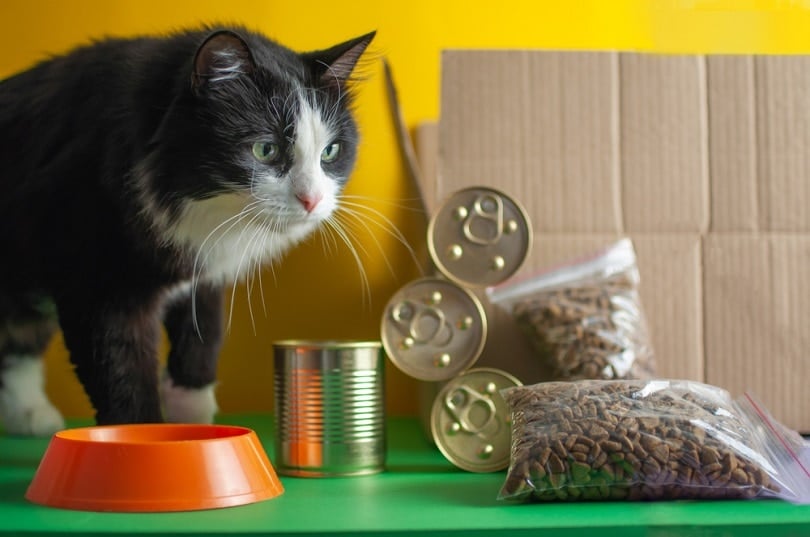
Canned or Dry?
There is debate about whether canned or dry food is better to feed a cat struggling with hyperthyroidism. It is ultimately up to both you and your cat. What does your cat prefer, and what are they more likely to eat? They need to eat plenty of food while they struggle with their thyroid, or they could lose dangerous amounts of weight.
There is the argument that canned cat food is better for them than dry food. The idea is that dry food tends to be less breed-appropriate. It often contains more carbohydrates than necessary and more protein from plants, which can be more challenging for cats to digest. But dry food is typically cheaper than wet food and is easier to find, store, and distribute. Wet foods can also sometimes cause stomach issues in some cats. The best thing to do is ask your vet what kind of food your cat needs at this time.
If it’s kibble, wet, or a combination of both that your cat enjoys, choosing the right cat bowl to serve it in goes far beyond presentation. Your cat's comfort is at the forefront with the Hepper NomNom Cat Bowl! The unique design benefits cats in many ways - dual stainless steel bowls are shallow and wide to aid with whisker fatigue and slight elevation for proper posture. The wide catch tray ensures that all food (and water!) stays exactly where you’d expect it to be - inside of the bowl! Click here to learn more. At Catster, we’ve admired Hepper for many years and decided to take a controlling ownership interest so that we could benefit from the outstanding designs of this cool cat company!
Conclusion
It can take a while for your cat to land on their feet again after getting diagnosed with hyperthyroidism. However, with medical management and dietary restrictions, your cat can find their way back to health.
If you want the best overall cat food, Wellness Complete Health Grain-Free Canned Cat Food is low in iodine and supports your cat’s overall health. Also, many healthier cat foods are expensive, but the Solid Gold Indigo Moon Dry Cat Food gives you a health-conscious and budget-friendly option. Do you need something incredibly effective? Visit your vet about Hill’s Prescription Diet for Thyroid Care.
Finding the right food is hard enough, but it can be even more of a challenge when your cat struggles with health issues. We hope that our reviews have helped you find the right food so your cat can regain their health and balance.
Featured Image Credit: Pixel Shot, Shutterstock
Contents
- A Quick Comparison of Our Favorites in 2024
- The 6 Best Cat Foods for Hyperthyroidism
- 1. Wellness Complete Health Grain-Free Canned Cat Food – Best Overall
- 2. Solid Gold Indigo Moon Dry Cat Food – Best Value
- 3. Hill’s Prescription Diet Thyroid Care Dry Cat Food – Premium Choice
- 4. Hill’s Prescription Diet Thyroid Care Canned Cat Food
- 5. Nulo Freestyle Grain-Free Canned Cat & Kitten Food
- 6. Feline Natural Grain-Free Canned Cat Food
- Buyer’s Guide: Picking the Best Cat Food for Hyperthyroidism
- Conclusion

